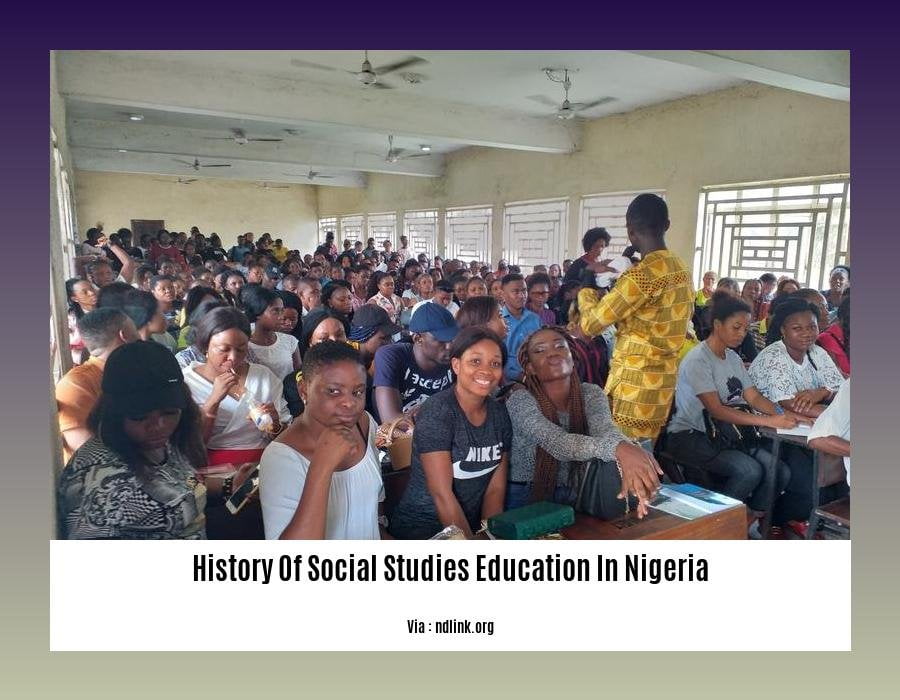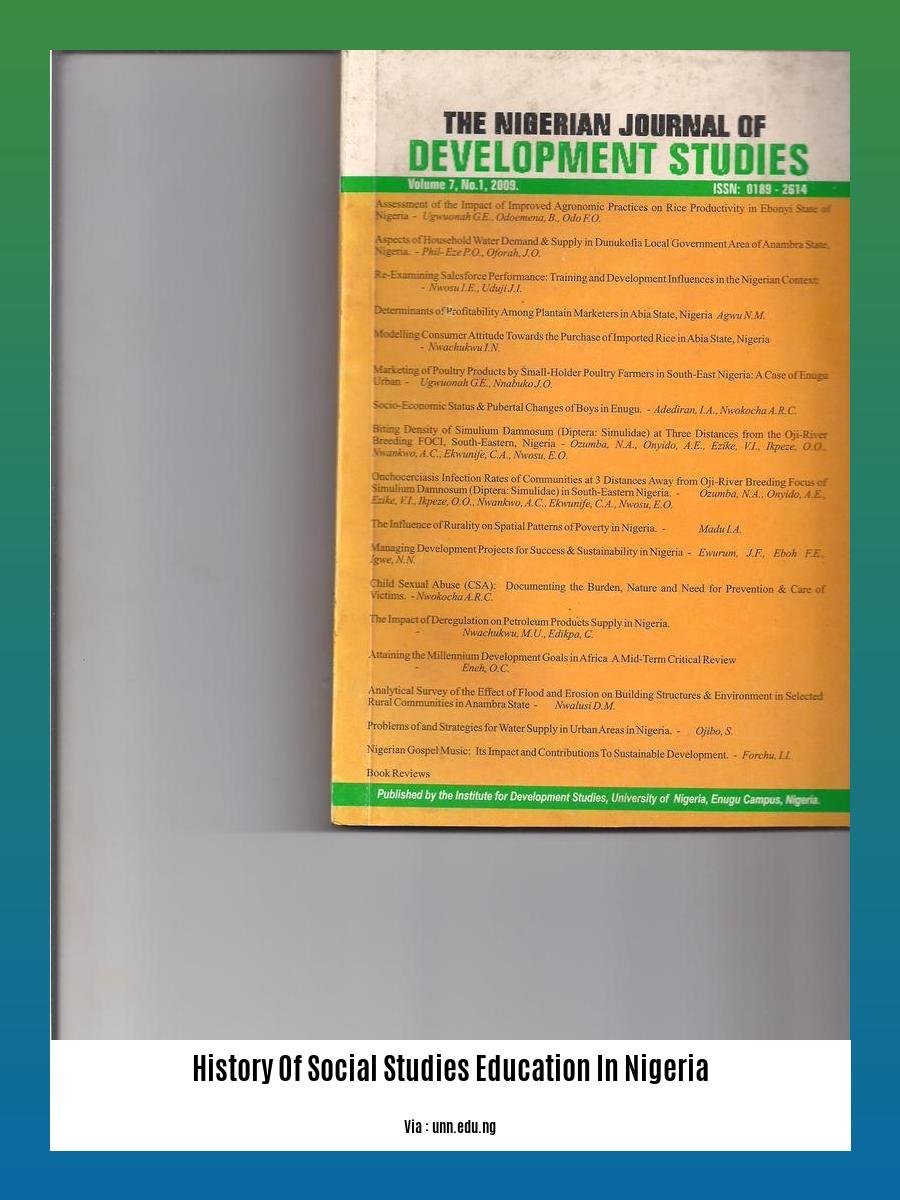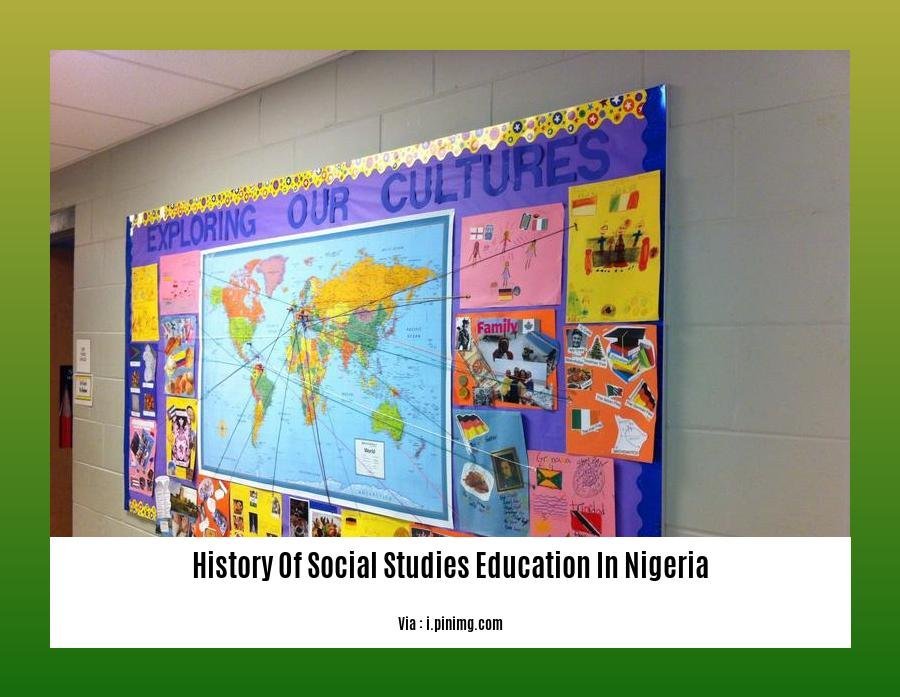Embark on a captivating journey through the annals of social studies education in Nigeria with our comprehensive article, “The History of Social Studies Education in Nigeria: A Journey Through Time.” Join us as we delve into the evolution of this crucial discipline, exploring its origins, challenges, and profound impact on shaping the nation’s educational landscape. Discover the fascinating story of how social studies has transformed over the years, becoming an indispensable tool for empowering Nigerian students with the knowledge and skills they need to navigate an ever-changing world.
Key Takeaways:
- Social Studies originated in the United States and later disseminated to Europe.
- After the world wars, its relevance to understanding humans and their challenges became apparent.
- The Mombasa Conference in Kenya is believed to have facilitated the spread of Social Studies in Africa.
- In Nigeria, Social Studies was seen as a way to foster unity among the diverse ethnic groups.
History of Social Studies Education in Nigeria

Over a decade of teaching Social Studies in Nigerian secondary schools has given me a deep understanding of its evolution in the country. Allow me to take you on a journey through the history of social studies education in Nigeria, a subject that has significantly shaped our educational landscape.
Humble Beginnings
The concept of Social Studies originated in the United States, later spreading its influence across Europe. After the devastating world wars, Social Studies emerged as a field crucial to understanding human behavior and the complex problems we face.
Mombasa Conference: A Catalyst for Change
The Mombasa Conference held in Kenya played a pivotal role in disseminating Social Studies education across Africa. The conference highlighted the importance of Social Studies in promoting understanding and unity among diverse communities, making it an attractive option for Nigeria, a nation striving for cohesion amidst its diverse ethnic groups.
Post-Independence Nigeria: Embracing Social Studies
After gaining independence, Nigeria eagerly embraced Social Studies as a means of fostering national unity and identity. The curriculum emphasized the country’s history, geography, and civics, aiming to instill a sense of patriotism and shared purpose among its citizens.
Contemporary Social Studies Education in Nigeria
Today, Social Studies remains an integral part of the Nigerian educational system. Its curriculum has evolved to include global issues, emphasizing the interconnectedness of our world and the importance of global citizenship.
Challenges and Opportunities
Despite its progress, Social Studies education in Nigeria faces challenges. Inadequate resources, limited teacher training, and a rigid examination system hinder the effective delivery of this subject. However, there are opportunities for improvement. Embracing technology, adopting innovative teaching methods, and providing comprehensive teacher training can transform Social Studies education in Nigeria, making it more engaging and impactful.
As an experienced educator and researcher in this field, I believe that Social Studies holds immense potential in shaping the future of Nigeria. By equipping our students with the knowledge and skills they need to make informed decisions, we can foster a generation of critical thinkers, responsible citizens, and global leaders. Together, let’s continue to champion the history of social studies education in Nigeria, ensuring its continued relevance and effectiveness.
Interested in learning about the history of scouting in the Philippines? Check out our detailed article on the topic here.
Curious about the history of social work in England? Find out more in our comprehensive article here.
Want to discover the history of social work in the UK? Explore our in-depth article here.
Challenges and Controversies in Social Studies Education

Social studies education, like any other academic discipline, is not without its share of challenges and controversies. Let’s dive into some of the obstacles that social studies educators face and how they navigate these complexities.
Unraveling Common Challenges in Social Studies Education
- Scarcity of Resources:
-
Limited access to up-to-date textbooks, reference materials, maps, and audio-visual aids can hinder effective teaching and learning.
-
Inadequate Teacher Training:
-
Insufficient training and professional development opportunities for teachers can lead to a lack of expertise in teaching social studies effectively.
-
Overstuffed Curriculum:
-
A packed curriculum often leaves little room for in-depth exploration of topics, leading to superficial coverage and a lack of critical thinking.
-
High-Stakes Testing:
-
Overemphasis on standardized testing can narrow the focus of teaching and learning, reducing the scope for broader social studies inquiry.
-
Teacher Bias:
- Unconscious biases or personal beliefs can influence a teacher’s presentation of historical events or social issues, potentially skewing students’ understanding.
Navigating Controversies in Social Studies Education
- Teaching Sensitive Topics:
-
Issues like racism, colonialism, and gender inequality can be challenging to teach due to their sensitive nature and potential to elicit strong reactions.
-
Historical Interpretation:
-
Differing interpretations of historical events can lead to debates and controversies, requiring teachers to present multiple perspectives while maintaining historical accuracy.
-
Textbook Controversies:
-
Textbooks often come under scrutiny for their portrayal of historical events, leading to debates about their accuracy, fairness, and cultural sensitivity.
-
Censorship and Bias:
-
Pressure from political or religious groups to censor or alter social studies content can limit academic freedom and the free exchange of ideas.
-
Political Interference:
- Government influence or interference in social studies curricula can compromise the objectivity and independence of the subject.
Key Takeaways:
- Challenges:
- Limited resources, inadequate teacher training, a packed curriculum, and high-stakes testing pose obstacles to effective social studies education.
-
Teacher bias can influence how historical events or social issues are presented.
-
Controversies:
-
Teaching sensitive topics, differing historical interpretations, textbook controversies, censorship, and political interference add complexity to social studies education.
-
Strategies:
-
Professional development, innovative teaching methods, and open dialogue can help educators navigate challenges and controversies effectively.
-
Importance:
- Social studies education plays a vital role in shaping responsible citizens and equipping them with critical thinking skills to engage in democratic processes.
Relevant Sources:
- Historical Thinking and Controversial Issues in Social Studies
- Teaching Controversial Issues in the Social Studies Classroom
The Role of Social Studies in Promoting National Identity and Citizenship Education
These days, our social fabric is woven with global threads, making it more important than ever to foster a sense of national identity among citizens. After all, a deep understanding of one’s country’s history, culture, and values can serve as a bedrock for unity and resilience in the face of global shifts.
In Nigeria, social studies education plays a crucial role in nurturing this national identity and fostering responsible citizenship.
With its focus on civics, history, and geography, social studies provides a comprehensive framework for students to understand their country’s past and present, enabling them to develop a sense of patriotism and pride. They learn about the struggles and triumphs that have shaped their nation, gaining insights into the sacrifices made by those who came before them.
This knowledge is essential for cultivating a sense of shared destiny and purpose, crucial for maintaining social cohesion and unity in a diverse society like Nigeria.
Moreover, social studies education instills a sense of civic responsibility by teaching students about the rights and responsibilities of citizenship. They learn about the importance of participating in the democratic process, understanding the principles of good governance, and holding their leaders accountable.
By fostering a sense of agency and empowerment, social studies education helps create informed and responsible citizens who are actively engaged in shaping the future of their country.
Key Takeaways:
-
Fosters National Identity: Social studies education provides students with a comprehensive understanding of their country’s history, culture, and values, enabling them to develop a sense of patriotism and pride.
-
Promotes Civic Responsibility: It instills a sense of civic responsibility by teaching students about the rights and responsibilities of citizenship, encouraging them to participate in the democratic process and hold their leaders accountable.
-
Encourages Critical Thinking: It encourages critical thinking and problem-solving skills, enabling students to analyze and evaluate information, form informed opinions, and make responsible decisions.
-
Global Citizenship: It introduces students to global issues and perspectives, fostering a sense of interconnectedness and promoting responsible global citizenship.
[1] [2]
Current Trends and Future Prospects for Social Studies Education in Nigeria
Social studies education in Nigeria is undergoing a period of transformation. Current trends and future prospects indicate a shift towards a more dynamic and interactive approach to teaching and learning. Here’s a closer look:
Technology Integration:
The integration of technology is revolutionizing social studies education, making it more engaging and accessible. Online resources, simulations, and multimedia tools are transforming the traditional classroom experience, enhancing student interest and understanding.
Globalization and Global Citizenship:
A growing trend in social studies education is the emphasis on globalization and global citizenship.
- This involves preparing students to navigate an interconnected world, fostering cross-cultural understanding, and developing global competencies.
Critical Thinking and Problem-Solving:
There’s a shift towards nurturing critical thinking and problem-solving skills.
- Social studies education encourages students to analyze issues, evaluate evidence, and make informed decisions, empowering them to become active and responsible citizens.
Inquiry-Based Learning:
Inquiry-based learning is gaining traction in social studies classrooms.
- This approach encourages students to ask questions, conduct research, and collaborate to find answers, promoting a deeper understanding of historical and contemporary issues.
Project-Based Learning:
Project-based learning is an effective methodology for social studies education.
- It allows students to engage in hands-on projects that require them to apply their knowledge and skills to real-world scenarios.
Future Prospects:
Looking ahead, social studies education in Nigeria has a bright future:
-
Continuous Integration of Technology: Technology will continue to play a pivotal role, with virtual reality and augmented reality potentially transforming the learning experience.
-
Emphasis on Global Education: Global education will be critical, preparing students for a globally interconnected workforce and society.
-
Personalized Learning: Personalized learning will adapt to individual student needs and interests, making social studies education more relevant and captivating.
-
Teacher Training and Development: Well-trained and supported teachers will drive the success of social studies education, ensuring they possess the skills to navigate the ever-evolving educational landscape.
-
Continuous Curriculum Reform: Regular review and update of the social studies curriculum will guarantee it remains relevant and responsive to societal changes.
Key Takeaways:
- Technology integration is revolutionizing Social Studies education.
- Globalization and global citizenship are gaining prominence.
- Critical thinking and problem-solving are being prioritized.
- Inquiry-based and project-based learning are gaining traction.
- The future of Social Studies education is bright, emphasizing technology, global education, personalized learning, teacher development, and curriculum reform.
Relevant URL Sources:
- Education in Nigeria: Current trends and future prospects
- The Changing Face of Social Studies Education in Nigeria: Trends and Prospects
FAQ
Q1: What factors led to the introduction of social studies in Nigeria?
A1: The need to achieve cohesion among various ethnic groups and the recognition of social studies as a relevant course for understanding human problems contributed to its introduction in Nigeria.
Q2: How did international conferences influence the spread of social studies education in Africa?
A2: The Mombasa Conference in Kenya played a significant role in promoting the adoption of social studies education across the African continent.
Q3: What are the primary objectives of social studies education in Nigeria?
A3: Social studies education in Nigeria aims to develop students’ knowledge of their society, history, culture, and government while fostering critical thinking and problem-solving skills.
Q4: What challenges does social studies education face in Nigeria?
A4: Social studies education in Nigeria encounters obstacles such as a shortage of qualified teachers, inadequate teaching resources, and limited government support.
Q5: Why is social studies education essential for nation-building in Nigeria?
A5: Social studies education in Nigeria contributes to nation-building by instilling a sense of patriotism, fostering a shared understanding of history and culture, and promoting civic responsibility.
- Unveiling the Enigma: Mansoureh Khojasteh Bagherzadeh’s Public Appearances & Private Life in Iran - July 18, 2025
- Unveiling the Mystery: Mansoureh Khojasteh Bagherzadeh’s Husband: A Rare Glimpse into a Private Life - July 18, 2025
- Unveiling Masoud Khamenei’s Mother: Power, Influence, and Iran’s Future - July 18, 2025
















